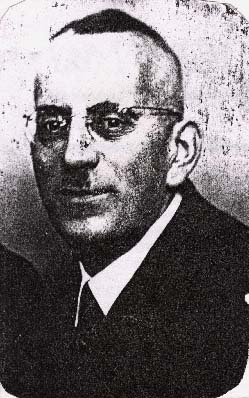Search for Names, Places and Biographies
Already layed Stumbling Stones
Suche
John Josephi * 1879
Löwenstraße 30 (Hamburg-Nord, Hoheluft-Ost)
1941 Minsk
further stumbling stones in Löwenstraße 30:
Selma Josephi, Hans Nathan
John Josephi, born on 19 May 1879 in Hamburg, deported on 8 Nov. 1941 to Minsk
Selma Josephi, née Stein, born on 14 Mar. 1889 in Rappoldshausen (Hessen-Nassau), deported on 8 Nov. 1941 to Minsk
Löwenstrasse 30
The Josephi couple came to Eppendorf in May 1914. The young couple had found a two-and-a-half bedroom apartment at Löwenstrasse 30. Ten months later, daughter Bella was born. The second child, Erika, followed on 3 Mar. 1922.
The parents were members of the Jewish Community and sent both their children to the Israelite Girls’ School on Carolinenstrasse.
John Josephi earned a solid income. He had learned the trade of insurance broker and was employed by the Hamburg-based Hamonia Company. Since the 1920s, he worked as a field representative, gradually rising up the career ladder.
The family spent their spare time in their own allotment garden in the adjacent district of Lokstedt. In retrospect, daughter Erika wrote: "[My parents had] an allotment garden covering approx. 800 square meters [approx. 8,600 sq. ft.] featuring a rich stock of fruit trees and a fully furnished weekend cottage that served the family as a home in the summer months.”
When the Nazi Party (NSDAP) assumed power in 1933, John Josephi’s professional career came to a sudden end. The company did not want to continue employing Jews. At first, he tried to keep afloat as an independent insurance agent. In the context of a quarrel with another insurance agent, he gave the following statement: "In the year 1933, after the [translator’s note: Nazis’] assumption of power, I generated hardly any business, prompting the company [author’s note: the Hamonia AG] to set up an agency for me in an amicable agreement.” The files of the Restitution Office (Amt für Wiedergutmachung) contain a report by Paula Bruhns (probably a friend of the family) dating from 1955 that states: "In 1933, John Josephi [was] dismissed without notice from his long-standing job with the Hamonia Insurance Company. After that, he had no means to earn an income and later was forced to perform compulsory labor duties, as was his wife, who started work in a commercial kitchen.”
The family looked for a way out of the increasing financial straits and the repression. Both daughters would have liked to study at university but due to the omnipresent restrictions on Jewish men and women, that was out of the question. Bella worked as a nanny ("Kinderfräulein") in order to contribute at least a small share to the family income. As time passed, the Josephis realized: They had to leave Germany. One of the mother’s brothers had already emigrated to the USA. Why should they not succeed in doing so? The parents decided to bring their children to safety first. For his youngest daughter Erika, John Josephi submitted an application for emigration to Palestine. Bella was to depart for Britain. Preparations were made for the parents’ own emigration there. On 2 Nov. 1938. the Gestapo started a file memorandum (with an incorrect place of birth): "The insurance agent John Josephi, born on 19 May 1889 in Rappoltshagen, District of Homburg, citizenship DR [Deutsches Reich – German Reich], HH [Hanseatic City of Hamburg] Löwenstrasse 30, intends to emigrate to Palestine.”
In Oct. 1938, Erika Josephi was taken to Palestine by the Youth Aliyah. Her sister Bella was allowed to depart for Britain in 1939. She got married there and emigrated to the USA in 1947.
A passage from Erika’s curriculum vitae, written on 25 Mar 1955, reads as follows:
"From 1928 to 1932, I attended classes in the eight-grade elementary school [Volksschule] and from 1932 to 1938, Realschule [a practice-oriented secondary school up to grade 10] classes of the Israelite Girls’ School on Carolinenstrasse in Hamburg.
Although I intended to study at university, due to the constantly increasing persecution of Jews in Germany, I decided to emigrate to Palestine, since completion of the studies appeared hopeless. On 25 Oct. 1938, I left Germany for Palestine – today Israel. At the start of World War II, my late parents lived in Hamburg, from where I got word from them several times by way of Red-Cross letters. In Nov. 1941, my parents were deported.”
On 8 Nov. 1941, the Josephi couple received the so-called "evacuation order.” Carrying a small amount of hand luggage, they were forced to leave the apartment. They would be, as the official jargon went, "resettled to the East.” They were not informed that the transport was destined for the Minsk Ghetto.
In Minsk, a "special ghetto for Jews from the Old Reich [Altreich, i.e., Germany within the 1937 borders]” had been set up. The Josephis were crammed into train cars and transported there along with 966 other people. Only 16 of them would survive this crime.
Accurate down to the mark and pfennig, the Chief Finance Administrator (Oberfinanzpräsident) listed the proceeds from the "Josephi” compulsory auction in Jan. 1942. Household effects, a typewriter, and jewelry generated 1,543.45 RM (reichsmark) for the Reich treasury. A few weeks later, the file was complemented: Another 30.00 RM was added to the sum.
When and where the Josephis were murdered remains unknown. The couple was declared officially dead at the end of 1945.
Translator: Erwin Fink
Kindly supported by the Hermann Reemtsma Stiftung, Hamburg.
Stand: October 2016
© Klaus Kolb
Quellen: 1; 2; 4; 5; 8; AfW 190579 Josephi, John; StaH 314-15 OFP, Fvg 3060.
Zur Nummerierung häufig genutzter Quellen siehe Recherche und Quellen.


